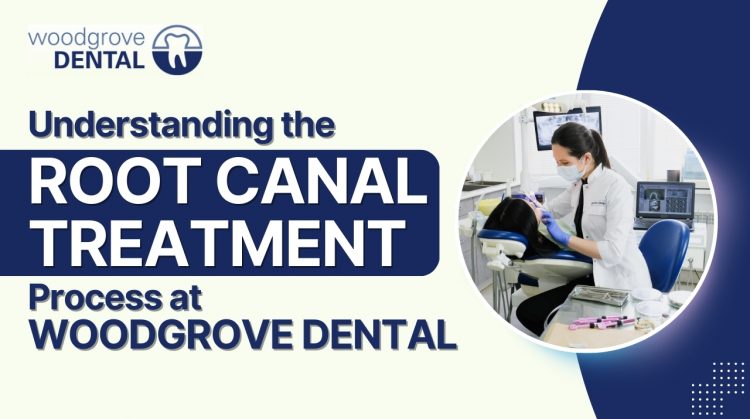A cloud of anxiety and misconceptions often surrounds root canal treatment, but it’s a highly effective procedure designed to save your natural teeth. If you’ve been told you need a root canal treatment, understanding the process can help alleviate your fears. By knowing what to expect, you can approach the procedure with confidence, knowing that it’s a crucial step in maintaining your oral health.
Our team at Woodgrove Dental aims to ensure that our clients feel as comfortable as they can during their visit to the clinic. Our dental equipment and machinery are the best in the market and our team will make sure that your root canal treatment is as comfortable as possible. If you have a severe toothache or you have been advised that you need a root canal, we are here to support you at every stage.
This blog article will cover the root canal treatment process, why it is needed, and how Woodgrove Dental makes it comfortable for you. We will also consider some of the myths and misconceptions that patients have concerning the said procedure.
Table of Contents
- Introduction
- Understanding the Importance of Root Canal Treatment
- How Woodgrove Dental Ensures Your Comfort
- What is a Root Canal Treatment?
- Definition and Purpose
- The Anatomy of a Tooth and the Role of the Pulp
- Why is Root Canal Treatment Necessary?
- When a Root Canal is Needed
- Consequences of Delaying Treatment
- The Root Canal Process at Woodgrove Dental
- Initial Consultation and Diagnosis
- Anaesthesia and Pain Management
- Pulp Removal and Cleaning
- Filling, Sealing, and Restoration
- Addressing Common Fears and Misconceptions
- Debunking Myths About Pain and Illness
- Strength of a Tooth After a Root Canal
- Ensuring Patient Comfort
- How Woodgrove Dental Prioritizes Your Comfort
- State-of-the-Art Facilities and Equipment
- Why Choose Woodgrove Dental for Your Root Canal Treatment?
- Expertise and Compassionate Care
- Advanced Techniques for Optimal Results
- What to Expect After the Procedure
- Recovery and Pain Management
- Aftercare Tips for a Successful Recovery
- Importance of Follow-up Visits
- Tips for Maintaining Your Root Canal Treatment
- Oral Hygiene Best Practices
- Avoiding Hard Foods
- Regular Dental Check-ups
- Conclusion
- The Importance of Root Canal Treatment
- How Woodgrove Dental Can Help
- FAQs
- Addressing Common Questions About Root Canal Treatment
- Contact Information
- How to Get in Touch with Woodgrove Dental

What is a Root Canal Treatment?
Endodontic therapy commonly referred to as a root canal treatment is a dental procedure that is intended to address infection or inflammation in the pulp of a tooth. The pulp also has nerves and blood vessels in it and when it gets inflamed because of decay or injury etc the person suffers a lot of pain and needs treatment.
In the process, the dentist has to drill and remove the infected pulp, clean the inside of the tooth and then fill the hole to avoid reinfection. A crown or filling is often put on the tooth after that to restore functionality and aesthetics of the tooth.
Why is Root Canal Treatment Necessary?
Endodontic treatment is needed when the pulp is irreversibly damaged or when the pulp dies. If left untreated, it progresses to abscesses, severe pain and in severe cases, may cause tooth loss. As a result of the procedure, not only is the tooth preserved, but the infection does not extend to the adjacent tissues.
The Root Canal Process at Woodgrove Dental
- Initial Consultation and Diagnosis: The first one is an assessment which may involve a physical examination, and often us X-ray to establish the degree of infection. Our dentist will then give a diagnosis of the symptoms and advise whether you will require a root canal treatment.
- Anaesthesia: Local anaesthetic is first applied to the tooth in question and the surrounding area to make the patient comfortable before the procedure starts. This means that you will not be in any form of pain during the process of the surgery.
- Pulp Removal: The dentist will make an entrance into the crown of the tooth in other to access the pulp chamber. The affected pulp, that is, the pulp that is infected or inflamed, is then gently removed with some specific instruments.
- Cleaning and Disinfection: Once the pulp is removed, the inside of the tooth is cleaned and disinfected to remove any remaining bacteria and prevent further infection.
- Filling and Sealing: The cleaned and disinfected space is then packed with the biocompatible material, normally the gutta-percha and then sealed to prevent the tooth from further infections.
- Restoration: After the root canal is completed, the tooth is restored with a crown or filling to return it to full function and appearance.
Addressing Common Fears and Misconceptions
- Root canals are painful: Some of the things that people think they know are that root canals are painful. But with the advanced technology, and the use of anesthesia the procedure is as painful as having a simple filling done.
- Root canals cause illness: It has been established that there is no scientific basis for associating root canal treatments with systemic diseases. The process is non-hazardous and is performed to reduce infection.
- Teeth treated with root canals are weak: Even though a tooth that has received an RCT is weaker, it is usually crowned and this strengthens the tooth to function as any other tooth.
Ensuring Patient Comfort
Woodgrove Dental is committed to ensuring that all our patients are comfortable at all times. We know that dental procedures can be very anxiety-provoking and that is why we go out of our way to make your visit as comfortable as possible. As soon as you enter our centre, we do our best to make you feel comfortable with our team. Our facilities are comfortable, we employ state-of-the-art equipment, and our staff is always ready to address your questions or fears regarding root canal treatment.
Why Choose Woodgrove Dental for Your Root Canal Treatment?
At Woodgrove Dental, we understand that the idea of a root canal can be daunting. Our experienced team is committed to providing gentle, compassionate care, using the latest techniques to ensure your comfort and the best possible outcome. We take the time to explain the process and address any concerns you may have, so you can feel confident and at ease.
What to Expect After the Procedure
Recovery: Some patients may feel pain after a root canal has been done, but this is normally relieved by the use of paracetamol or other similar drugs. It may be tender for a few days, but this should not be for long, especially with a decrease in the inflammation.
Aftercare: It is our policy to explain to you how you should take care of your tooth after the treatment. It may involve advice on feeding and mouth care to promote tissue repair and reduce risks of infection.
Follow-up Visits: It’s important to attend follow-up appointments to ensure the tooth is healing properly and to make any necessary adjustments to the restoration.
Tips for Maintaining Your Root Canal Treatment
- Maintain Good Oral Hygiene: Brush and floss regularly to keep your teeth and gums healthy.
- Avoid Hard Foods: Try to avoid chewing hard foods on the treated tooth until it is fully restored.
- Regular Check-ups: Regular dental check-ups will help monitor the health of your root-canaled tooth and prevent future issues.
Conclusion
The process of root canal treatment is very important as it can help you save your tooth and, at the same time, get rid of any pain that you might be experiencing. Here at Woodgrove Dental, we ensure that you complete the process in the most comfortable way possible, taking care of your oral health. If you are in pain, or if you have been advised that you need a root canal, please do not hesitate to contact us. We have professionals in our team to ensure that you are assisted throughout the process.

FAQs
- Is root canal treatment painful?
- No, root canal treatment is performed under local anesthesia, ensuring that the procedure is as pain-free as possible.
- How long does the procedure take?
- Most root canal treatments can be completed in one or two visits, depending on the complexity of the case.
- What should I expect after the procedure?
- You may experience mild discomfort for a few days, but this can usually be managed with over-the-counter pain relievers.
- Can the treated tooth get infected again?
- With proper care, the treated tooth should not get infected again. However, it’s important to maintain good oral hygiene and attend regular dental check-ups.
- What if I delay treatment?
- Delaying treatment can lead to worsening infection, increased pain, and the potential loss of the tooth. It’s important to address the issue promptly.
Contact Information:
If you would like more information about root canal treatment or to make an appointment please contact us at (03) 8746 2237 or come to 4b/211 Barries Rd, Melton VIC 3337. Our team is ready to help you and your child with any questions you may have and to assist you in achieving the healthiest and best-looking smile possible.




Leave a comment